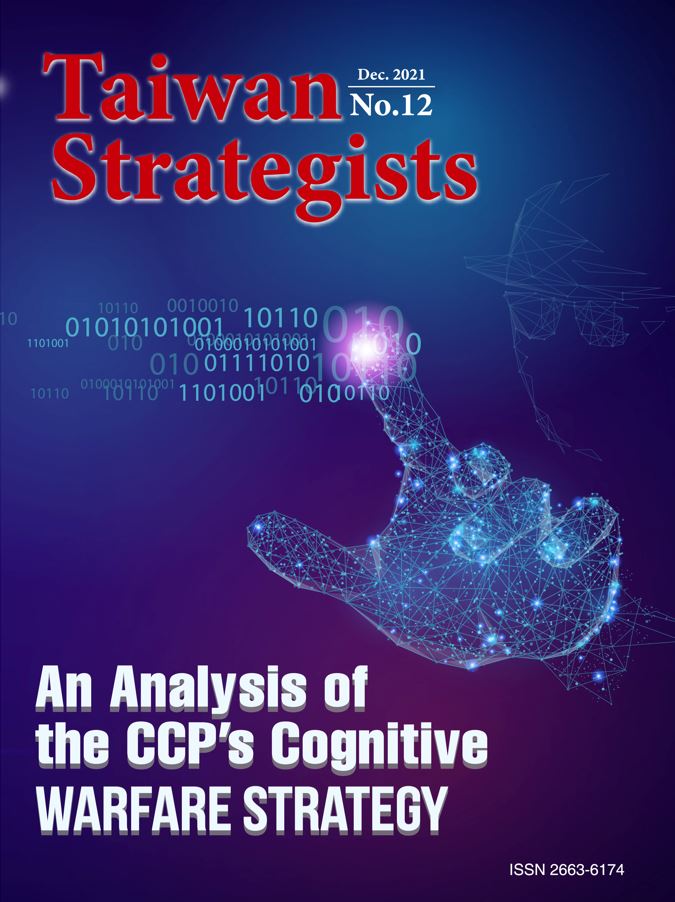Taiwan Strategists No. 12
The Strategic Deployments of China’s Cognitive Warfare Under Xi Jinping
Yao-yuan Yeh
Chair and Associate Professor,
Department of International Studies & Modern Languages,
University of St. Thomas, Houston
Judging by military expenditure, China currently ranks second in the world, right after the United States. It is also the second-largest economy by nominal GDP. Its ambition to become a key player and rule maker in the international system is obvious, and its dream of replacing the U.S. hegemon and countering Western democracies is China’s next goal. However, since the existing hegemon, the United States, and China are both nuclear powers, a direct military confrontation is certainly not a direction both sides envision. Therefore, to manipulate the public in the U.S., Taiwan (its top foreign policy priority) and Western societies, China urgently needs an alternative mean to generate a pro-China environment and thereby pave its road to hegemony. The solution to this puzzle is to utilize cognitive warfare to create a benign image of China and to further stimulate domestic problems among targeted societies. This paper reviews the strategic deployments of China’s cognitive warfare and discusses how China free rides freedom of speech and media to wage cognitive warfare among those countries. It contends that the current deployment of cognitive warfare has been half successful, with more backfiring likely, which will nullify years of efforts in this conduct.
Keywords: Cognitive Warfare, Disinformation, Cyber Espionage, Freedom of Speech and Press, China
How China Initiates Information Operations Against Taiwan
Puma Shen
Assistant Professor,Graduate School of Criminology,
National Taipei University
China’s information operation tactics have become a threat to the world, especially in the case of Taiwan. In addition to cyber-attacks, the disinformation campaigns initiated by China have expanded in the last five years. Traditionally, researchers utilize the cyber kill chain model to explain the dissemination of disinformation. However, the motivations and echo-systems of this model have seldom been explored. This article discusses the concept of 3Is: direct information operations initiated by Chinese actors, indirect investments toward Taiwanese local citizens, and an ideology driven approach that weaponizes people in the market of disinformation. This categorization reveals the adversaries within the industry of production, their motivation, and their effectiveness. I further argue that, using COVID-19 narratives as an example, the 3Is collaboration indicates that China is capable of doing serious harm to foreign countries.
Separate the Wheat from the Chaff: Taiwan’s Challenges and Mitigation Strategies Against Disinformation
Chen-yi Tu
Assistant Research Fellow,
Division of Cyber Security and Decision-Making Simulation,
Institute for National Defense and Security Research
Disinformation is an age-old issue that is facilitated by digital technology. While advances in technology such as the Internet already poses challenges for governance, disinformation has evolved rapidly from discourse in domestic politics to international security. Taiwan has developed its own strategies for countering disinformation and has achieved a certain level of success, but challenges remain from the overall information environment and new technologies such as deepfakes. Despite all these challenges in countering disinformation, there are opportunities for Taiwan. The key is viewing disinformation from a new perspective. Although disinformation related to politics usually receives most of the attention, it should be noted that disinformation also threatens human security. The harm caused by disinformation, such as that seen during the COVID-19 pandemic, illustrates how it can threaten people’s survival, livelihood, and dignity by exacerbating the effects of a traditional health emergency. Besides a transparent, multi-stakeholder approach that enhances engagement from government, fact-checking organizations and social media platforms will continue to be essential for sustaining success. And a human-centered approach is a necessary next step. Building a platform for further collaboration and promoting a healthy information environment, Taiwan can better share its experiences with disinformation to international community.
Keywords: Disinformation, Information Environment, Digital Media, Human Security,Internet Governance




